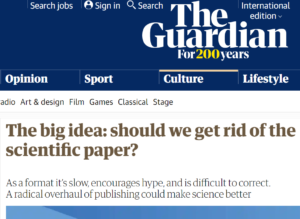
The author provides a summary of the latest edition of the conference Academic Publishing in Europe (APE) held online in January 2022. Among many subjects addressed, Todd Carpenter, Executive Director, NISO (National Information Standards Organisation), Washington, DC, has drawn attention to the importance of persistent identifiers, such as those for books (ISBN), journals (ISSN), and digital publications (DOI), for metadata infrastructures, content discoverability and dissemination channels. This also directly relates to the focus that Martyn Rittman, Product Manager, Crossref, has placed on the metadata quality, which is especially relevant for Open Access infrastructures that need to constantly adapt to be able to handle a wide variety of content formats, such as empirical datasets, methodology protocols, and digital contributions.
You can find another report of the event here and there.
The recordings will be available until long after the conference as part of the Permanent Record.


